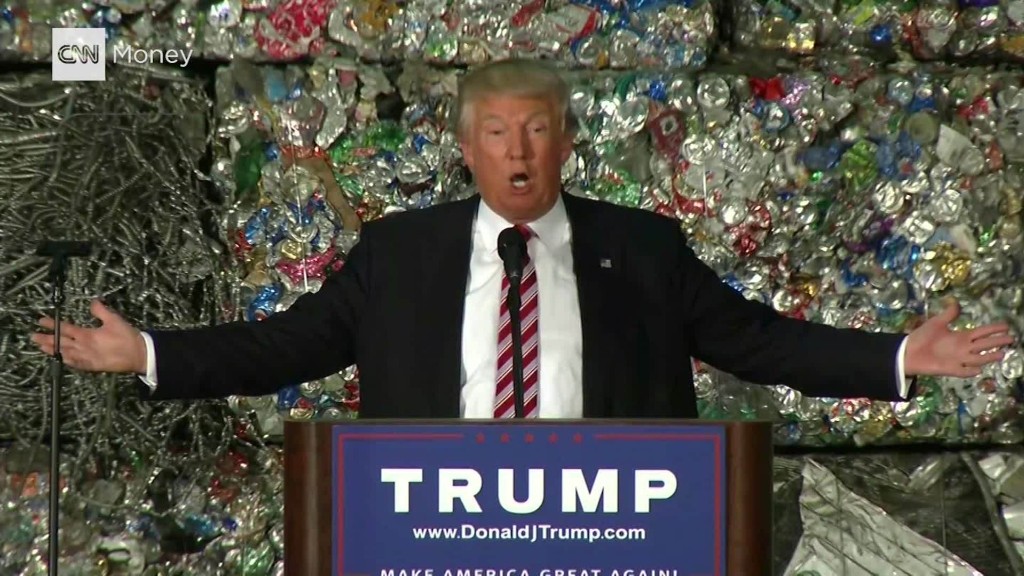
Donald Trump once again trashed NAFTA and U.S. trade policies that he said have cost millions of Americans their jobs. He promised to revive the country's manufacturing sector by limiting U.S. involvement in global trade and putting "America first," instead.
CNNMoney looks at trade's impact on American jobs and Americans' lives:
1. What's happened to manufacturing jobs in America?
The nation has seen a decline of nearly 5.5 million manufacturing jobs over the past 25 years. But the number of people employed in manufacturing has risen from a low of 11.5 million in early 2010 to 12.3 million last month.
2. Would some of those jobs have been lost even without free trade?
Just how many of those jobs disappeared due to trade remains a matter of debate among economists. About 20 million people lose their jobs due to layoffs and plant closures every year, and fewer than 5% of those are due to imports, said Robert Lawrence, a professor of international trade and investment at Harvard's Kennedy School of Government.
Related: Trump slams globalization, promises to upend economic status quo
3. Did NAFTA kill American jobs?
Many experts say no. The number of manufacturing jobs rose for years after it was signed. There were just under 16.9 million people employed in manufacturing in the U.S. at the start of 1994. The figure rose to as high as 17.6 million in 1998 and remained above 17 million until March of 2001, soon after former President Bill Clinton left office.
Related: American manufacturing isn't dead yet
4. Technology is also a factor.
The bigger culprit is technology, which has boosted productivity. But it also means that today's factory jobs require more training and skills, leaving many less-educated Americans on the sidelines. "Trade is a factor, but technological change has been more important," said Lawrence.
5. Were American companies already sending jobs abroad?
Yes, corporate America was already shifting jobs to lower-wage countries, said John McLaren, a University of Virginia economics professor. China's shift to a more market-driven economy drew U.S. companies looking for cheap labor to manufacture their goods, from sweatshirts to iPhones. "These are trends that would have gone on," McLaren said.
Related: Is trade really killing middle class jobs?
6. How are Americans benefiting from NAFTA and trade deals?
NAFTA virtually eliminated tariffs between Mexico, Canada and the U.S., opening the markets for American companies to sell more and buy more from its northern and southern neighbors. Also, it allowed American companies to shift some operations to Mexico, where labor is cheaper.
Without this access, American companies would find it harder to compete and could go out of business, said Gary Hufbauer, senior fellow at the Peterson Institute for International Economics. "The right way to think of it is that Ford would be out of business," said Hufbauer, naming Ford as an example of an American companies with operations in Mexico.
Also, without trade deals, America would lose access to overseas markets. True, the U.S. buys a lot from Mexico. But the U.S. also sold $214 billion in manufactured goods to Mexico in 2015, Lawrence said.
Related: Chamber of Commerce leads Big Business attack on Trump over trade
7. What does raising tariffs on Mexico, China and Japan mean for American consumers?
The tariffs would cost the average household $2,200 a year, or 4% of their after-tax income, according to a study from the National Foundation for American Policy conducted by David Tuerck, Paul Bachman and Frank Conte, all of Suffolk University. This is largely because imports under Trump's policy would become more expensive, raising the price of competing American-made goods by 11%. That would effectively levy a consumption tax on purchases and cut into the incomes of shoppers.
Related: Why it would be tough for Trump to bring jobs back from China
8. What about China?
Economists are more united in the view that America has lost jobs to China. The U.S began sending manufacturing jobs to China before it joined the World Trade Organization in late 2001. MIT Professor David Autor estimates that the U.S. has lost around 1 million manufacturing positions and 2 million jobs total to China between 1999 and 2011. This is about one-fifth of the manufacturing jobs lost during that time.
Correction: An earlier version of this story misstated the amount of manufactured goods the U.S. sells to Mexico. It sold $214 billion, not $49 billion.


